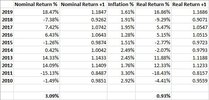- Joined
- 30 September 2012
- Posts
- 743
- Reactions
- 385
I never get to go all in after a crash (unfortunately), or at a peak (fortunately). I'm always all in.
Empirical evidence (related to my style of investing) convinces me that I'm probably better off all in over a long period of time.
Empirical evidence (related to my style of investing) convinces me that I'm probably better off all in over a long period of time.


